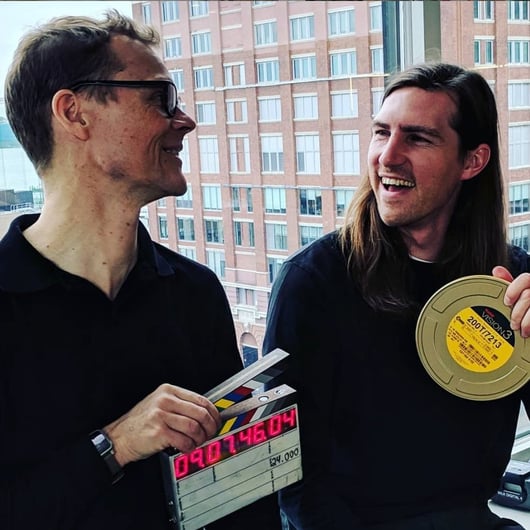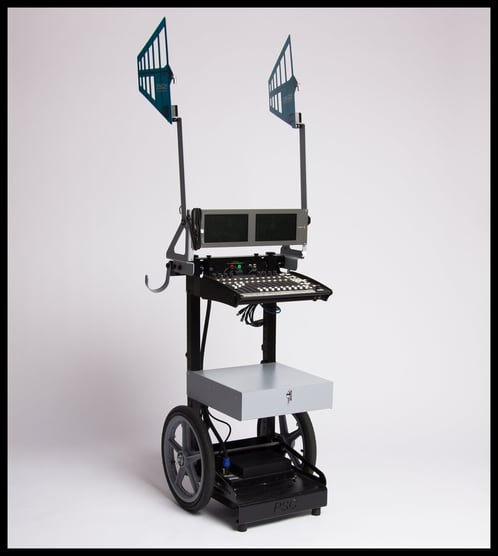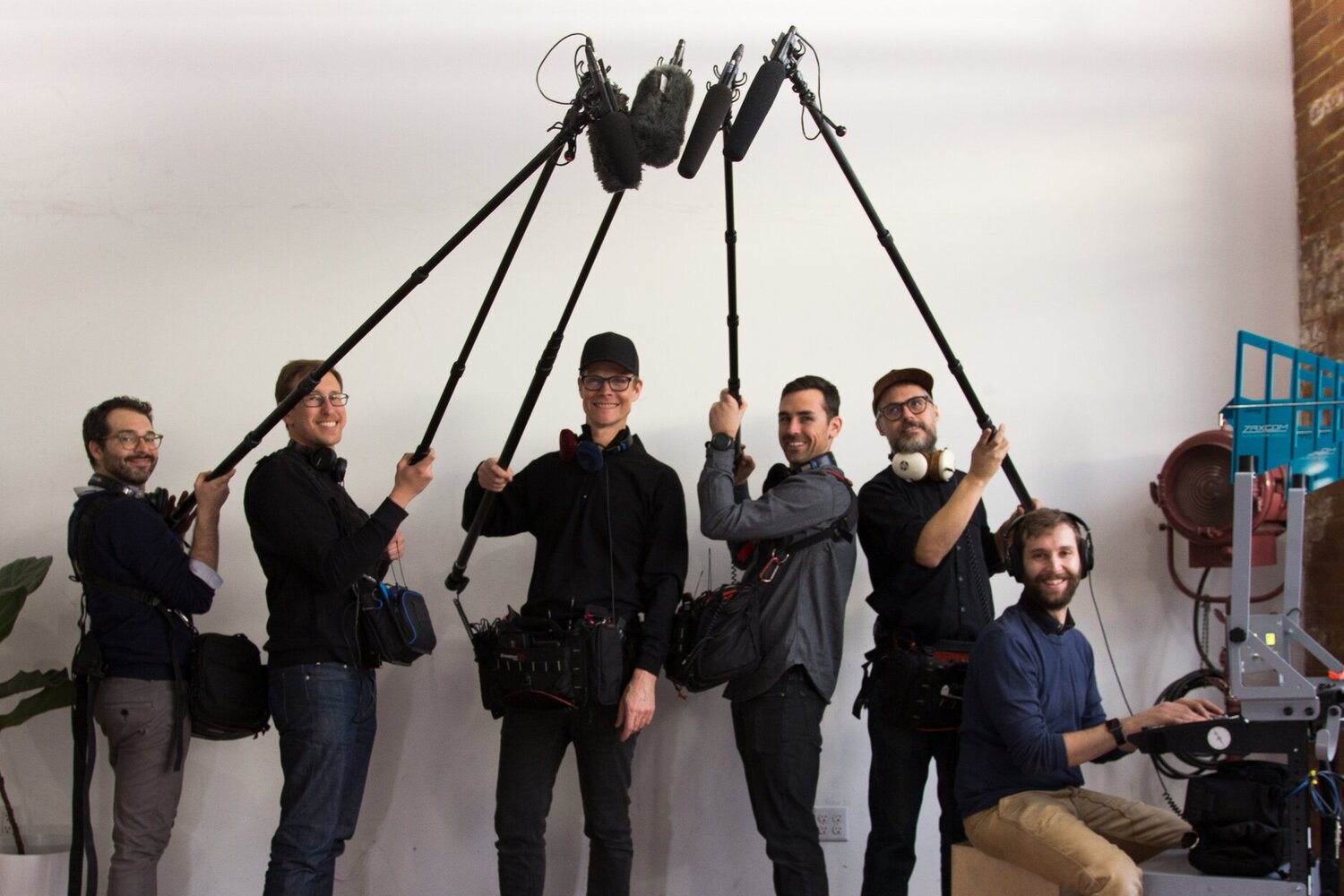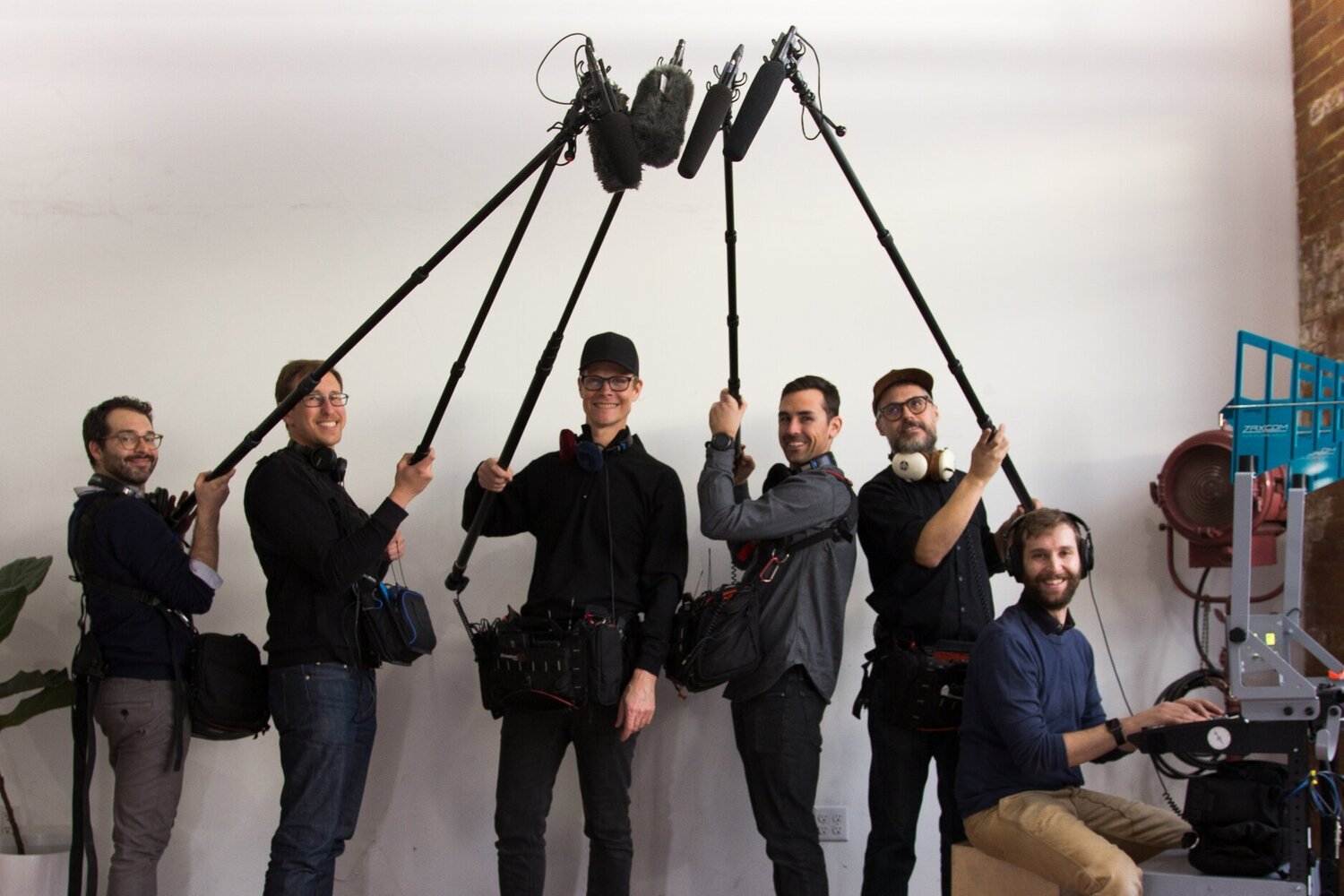The Sound Co-op: Building Collective Power as Creative Professionals
Huge numbers of artists and creatives are out of work as a result of COVID-19. And while we recognize that grants, fundraisers, and government aid are crucial right now, we know that they aren’t sufficient for us to rebuild our sector. We need systemic change to the ways that we work together, and in the ways that we work with clients and employers.
One possible structure to build systemic change is cooperatives, or co-ops. Cooperatives are formed when groups of people pool resources and share in decision-making to share in risk and reward. In co-ops, workers are the owners.
The Sound Co-op, a worker-owned co-op of sound mixers in Brooklyn, is using the structure of a co-op to reshape their lives as creative professionals. Founded in 2015 by Phil Shiman and Jon Moore, the Sound Co-op aims to provide better experiences for sound workers and their clients, as well as build collective power in the world of production.
Shipman’s interest in a co-op model of business first came from food. He worked with teenagers at Added Value, a nonprofit farm in Brooklyn (now called Red Hook Farms) and then worked in the Occupy Wall Street Kitchen, which fed protesters in New York in 2011. The Occupy Wall Street Kitchen turned into a worker-owned cooperative catering company that lasted for a few years.
Next for Shipman was to bring the co-op framework he had honed as an organizer into his career in sound. So he started talking to his fellow freelancers on set, and eventually the Sound Co-op was born.
Shipman gives us a look at how the Sound Co-op works, how their structure has prepared them to weather the COVID-19 crisis together, and how their work fits into larger issues of economic justice.
How did you start building the team for The Sound Co-op?
I just started having conversations with people on set. People would step forward and we would work on meeting and talking about what our dreams were and talking about what [solutions] might look like.
We are all isolated in the industry as freelancers. The system works that way. There's no way in the non-union space in sound to learn from somebody else. There's a lot of existing informal systems about how sound people support one another or freelancers support one another in terms of working conditions and pay. And we're struggling with those things all the time. And we're pitted against each other in competition. Now, safety and health is a big [issue].
It was [about] working conditions, pay and negotiating position and mutual support.
People died in coal mines for the eight-hour day. And the standard in the industry is 10 or 12 hours a day. Some people don't want to offer you overtime even over that, but you're expected to work 10 to 16 hour days. There's [also] when meals are served whether you get to eat. There's health and safety; some sets that are more dangerous than others.
[I started] to have those conversations about building on existing systems where people cooperate, formalizing them and introducing worker co-op principles of becoming a company; how to make all those informal systems, formal systems and stronger and building a movement and building a business at the same time.

What are the nuts and bolts behind the Sound Co-op? What was it like to create it?
One of the things that makes co-op a co op is the way that capital is arranged.
We have a membership share that is a stock like it is in a capitalist company, but it doesn't grow to benefit the individual. It's just a capital that you are a steward of. We all sold our equipment to the co-op to satisfy a requirement for membership share. That capitalizes the company, and that gives each member one share and one vote. That's also the basis of our democratic governance. One worker, one vote. We decided our decision making process would be consensus decision making, at the board level. So there's a board that directs the company, democratically by consensus, and then there's management. But beneath that, and then there's operations beneath that.
Right now, we're small enough that everybody's everything. But since we have a growth mindset we've designed it so that as we grow.

The bottom level is also the top level. As a member, you make the highest level of decisions. The membership actually elects the board and directs the board. That's where one of the mechanisms of democracy comes in.
We made a decision early on that we wanted to have the word “cooperative” in our name. So we decided to be a cooperative corporation. We chose the same legal entity as a food co-op. And that means that we all need to be W2; we have to be employees of the cooperative. Then all the paperwork comes in, you know; all the W2's, disability insurance,family leave insurance and all those things. We were super happy that we did [all of that before COVID-19)] because instantly we knew that we were eligible for the paycheck Protection Program and EIDL and we got it in the first round.
[As a co-op], you have to have bylaws. In the year leading up to our incorporation, we decided on our bylaws together as a membership and a board.
Tell us more about the Sound Co-op’s bylaws and how you arrived at them.
Bylaws are how you want the co-op to operate on a level of governance. That means how one joins the co-op, how one leaves, how much they make, what membership share is when it's paid, how it will be paid back when you leave. It also includes the path to ownership. One of the important things about a worker co-op is you can't just employ contractors forever as contractors because the workers own the business. So [our bylaws] specify that after a certain amount of time, you're automatically offered membership.
[Our bylaws also cover] how the board operates, when there are membership meetings, and how the members control the board. Those kinds of decisions that are extensive to the entire membership and have a long enough time horizon to be dealt with democratically at that level.
What does it mean to set in place all these structures, even when the Sound Co-op is small enough to be on a group chat?
I think there's two things.
There's the growth mindset that we all have – this is about growth and change. This is about growth and change for us as individuals to become different people than we are in a capitalist world. This is about sharing money and power and learning how to do that interpersonally and what that means for our own attachment to control or greed or whatever it might be.
And then it's about making social change. It's about creating a company that can then be a win-win for us and for whoever else wants to come in. And growing a movement to create economic change on a larger scale. So that growth mindset informs the fact that we want to create systems that can grow.
On the other hand, there's this part that's about just running a company democratically. When you run a company democratically, one of the principles is sharing of information. And another principle is creating [a system]. When you create a system, the system can only be democratic if everyone can understand it, and have control over it together. So that means a lot of agreeing on things and a lot of documentation as to what those systems are. Because otherwise you just have control by informal means with unseen levers of power: seniority age experience, give a shit about it, you know, more willing to do more work, willing to put in more time all these things that we know from informal clubs and informal organizing. One of the big influences on me for that was the Tyranny of Structurelessness by Jo Freeman.
Creating all these systems is not just to have a growth mindset, but it's also just to enable democratic decision-making by the membership.
What it has felt like to engage in a formal practice of sharing power?
It's double sided. One of the [challenges of working as a freelancer] is isolation. Some people call it being a lone wolf. And I think that's the position you're in as a sound person in a non-union world, in production. And so [sound] attracts people who like that. If you can succeed at that, you probably are pretty self-sufficient, you probably are pretty good at just taking care of yourself, you probably love the control you have from being a one-person business. You love having all your equipment just being exactly the way you want it. That's one of the great pleasures of doing that.
Now, my business partner is in charge of equipment, and he's configuring it so it's the same for everyone. And he's making the decisions about what equipment we get. And so I've had to let go of that [control]. I've had to convince other people [that] it's better if you let go of that a little bit.
The flip side of that is now I have a whole team of people, a whole team of minds, and a whole team of support to take some of that burden off me. It contributes to investing in equipment together by pooling our resources by pooling our knowledge and depending on someone else. So that's a big transition.

I don't need that control that I used to have. I feel a little calmer about that. I don't really need to have the equipment exactly the way I want to. It's okay. Now I have something much, much more important, which is during this time, I have the support of my colleagues to get me through like the COVID-19 crisis.
What are some of the benefits you get from being a part of a worker-owned co-op?
Getting through the COVID-19 crisis, we found ourselves prepared for a crisis no one foresaw.
I've been talking to other people who got laid off. They're in so much uncertainty about their economic future. We're in uncertainty about our economic future, but we're together because we're not gonna fire ourselves, we're gonna keep working. We're gonna keep investing in the business. It's got me wondering, is one of the strategies for survival for businesses that are at risk right now to buy their employees in? Could a restaurant cut its employees in as owners and gain the assets of having people work together now to build economic value for a couple months from now and a couple of years from now, sort of keep their company that way?
We're invested and that means we're together and we're supporting each other. And the money stays here; the money's not leaving. Keeping capital in the community is one of the benefits of a worker co-op. Since it belongs to the workers, the money stays local. We have a more resilient business because our fates are tied together, our sales are tied together, we share in a pool of revenue.
We're at a level of business that our colleagues are not at. So we're interviewing people to come in, and I'm showing them how to read a profit and loss statement, how to read a balance sheet.
What are some of the larger political ramifications of worker-owned co-ops?
There's a connection to the kind of change we're trying to make for ourselves and the change we're trying to make in the world, on the level of racial and economic justice. There's high stakes.
Racism was created for economic reasons. Slavery was created for economic purposes. The economic conditions continue to underlie what's going on in the world with racism and police brutality and equality. [We're talking] about how to make alliances with people of color who have a long history of cooperative economic thought and practice.
There's a deeper and higher purpose that we have by being workers and owners. We're going further than just being a nonprofit, we're going further than just being a union. We're not just making demands of the owners, we're being the owners. So we're taking ownership over the economy in a way that is transformational because it can create a just and sustainable economy by being democratic.
How have you been building power, coalition, and relationships with other co-ops?
I'm doing a lot of learning and a lot of listening and a lot of trying to create relationships. One of the principles of cooperatives, is cooperation among cooperatives. So you kind of lean on that.
One of the things we discovered as we started going through the COVID-19 crisis was that health and safety getting back to work is going to be a major issue for us. Immediately we turned to another co-op, Action OSH, [an immigrant-run co-op] that does Safety and Health Training. We got training through them. We can find practical common business partnerships to be involved with and create conversation. You know, that's a way we can have an exchange and cooperate among co-ops.
[The Sound Co-op has now built another co-op, Production Community Works Project, in partnership with Action OSH to focus on popular education training for COVID-19 safety in the production workplace.]
We start to think about how to be leaders as college educated White men and how to share what people need and what people want. As a co-op composed of White people, we are trying to educate ourselves. For example, we started a co-op reading group and are reading Collective Courage: A History of African-American Cooperative Economic Thought and Practice by Jessica Gordon Nembhard. We're listening to what people of color co-ops and other organizations are asking for, and are communicating our support interpersonally and on social media.
What opportunities do co-ops represent for freelancers, creatives, and artists who are out of work right now?
One of the assets we have right now is time. [The Sound Co-op] created a project called the Community Works Project out of which came our Safety and Health partnership with Action OSH. We gave it the name Community Works project with the recognition that it's more easily clear right now that what generates value in our economy is workers’ work. There's not going to be a financial instrument solution out of this. All the government aid and grants are important. But you can see how the economy is based on workers' work. That's an asset we have and we can use.
Our idea was just to work together without pay to figure out what our community needs almost in a mutual aid kind of way. If we can piece together those relationships, and we can work together, we can build value. You can get together with your other freelancer colleagues, and you can start a co-op now because we can meet. Our lives are so busy otherwise, we have so many appointments and places to be that it's hard to get sound people together. We can work right now and we can build value that's real. We can build a company right now.
How has the Sound Co-op been supporting your community during COVID-19?
The Community Works Project took the shape immediately of town halls. We sent out surveys and invited people to Zooms.
When we had the safety and health town hall, it became apparent that it was major. It's obviously a public health issue, personal health issue, and an economic issue. We understood that there's a lot of pressure coming from our clients to produce content. And that we're going to be in the middle of that. We had already started getting phone calls, especially from scrappy documentaries wanting to shoot in the field.
We had Action OSH as a panelist on one of our town halls. From there, there were some people interested in a workshop. We fundraised for an Action OSH Safety and Health Workshop for Production.
Now, I'm feeling a lot stronger in terms of my knowledge and understanding of how to deal with going back to work, both in terms of workers’ rights and in terms of how to relate to employers and productions. And then how to analyze situations individually. Out of that workshop, there became the Safe Crews, Safe Shoots Network. Productions and workers and crews are getting together to see what we can do next. We've also scheduled the training of trainers to get us trained to train other production professionals on safety and health in the industry
We invited our clients to these workshops, because we wanted to work together with them. We're workers and we're owners of our company. So I think we're in a specific position to be a bridge between crew members and productions, because we're wearing both hats in our business. We have clients who really care about their crews and who really care about safety. And we have crews who really want to be safe and who really want to work with clients who care and who are putting safety and health into practice.
One of the concerns in one of the workshops was, "What if you got to stop work?” What if a shoot doesn't happen because you have unsafe conditions and the shoot falls apart? Maybe we have to book two days instead of one. So we have a backup day in case things go wrong.
It's the right of every worker to ask their employer to fix an unsafe situation. If they don't fix it, and they're in imminent danger or at imminent risk, they have the right to leave the worksite. By doing these safety and health workshops, there's a way that we're understanding our own power and we're understanding how to draw boundaries together in a really important way that's important for us personally, and it's important for the health and safety of each other on set and for public health and safety. There's a way that we are creating systems and networks and relationships to preclude that situation.

Where should people go to learn more about worker-owned cooperatives, especially if they are interested in starting one themselves?
You can get good information at the US Federation of Worker Cooperatives website. If you're in New York City, you can get some good information on the New York City Network of Worker Cooperatives website. You can contact us. There's the Democracy at Work Network (DAWN). Just a couple of those sources can connect you with the local national international network of resources that are available for you to start thinking about it.
You can follow the Sound Co-op’s latest news, and keep up with them on Facebook and Instagram.
Learn more about co-ops and how they can be beneficial to artists and creatives, especially when we find out exactly how few safety nets are there for us professionally and personally.
About Nina Berman
Nina Berman is an arts industry worker and ceramicist based in New York City, currently working as Associate Director, Communications and Content at Fractured Atlas. She holds an MA in English from Loyola University Chicago. At Fractured Atlas, she shares tips and strategies for navigating the art world, interviews artists, and writes about creating a more equitable arts ecosystem. Before joining Fractured Atlas, she covered the book publishing industry for an audience of publishers at NetGalley. When she's not writing, she's making ceramics at Centerpoint Ceramics in Brooklyn.


